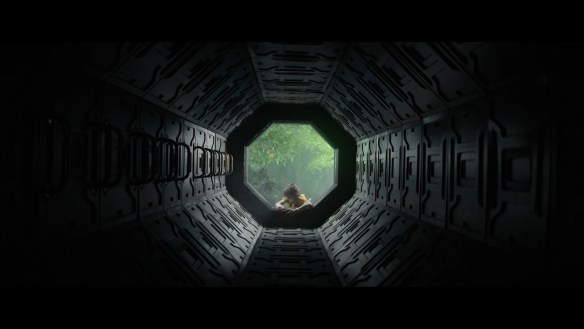Hello folks, and welcome back to Wrong Every Time. Today we’re returning to the far flung planets of Andor, where our hero Cassian has found himself in a whole heap of trouble. Not that he’s actively trying to be a hero or anything; he’s only seeking his sister, lost in the fallout of whatever happened back on Kentari. But it is rarely an innate sense of heroic responsibility that leads us to enact great changes on our world; just like the unfortunate string of coincidences that led to Cassian’s downfall, heroism is mostly our retroactive designation for a combination of desperation, opportunity, and luck.
Andor has done an excellent job of grounding its drama in mundane realities, and of emphasizing how, when lodged under the heel of oppression, most people simply carve out a nook where they can be pressed down upon with greater comfort and security. That in turn increases its sense of urgency; with no hope of a messiah lifting these people out of their circumstances, the threats they face feel that much more implacable, and their small acts of solidarity and rebellion that much more essential. We don’t need to be heroes to fight what seems inevitable; we simply need to embrace solidarity over comfort. Rebellion is housing the hunted, hiding the knife, keeping the secret. Fascism’s greatest strength is its presumption of inevitability; in truth, defeat is only inevitable if we believe it so.
Episode 3
We begin this episode with another variation on Andor’s signature image: a single character isolated at mid-distance and center frame, lost within a forbidding environment. This time, it’s Cassian in our flashback narrative, as he enters the crashed craft back on Kenari
I assume this is where he found the must-have item he’s currently hoping to trade for freedom
Though it’s clear Cassian’s village is somewhat accustomed to space flight as a concept (particularly given the empire’s strip mining operation), I imagine this still must feel a bit like investigating the crashed chariot of a violent god. The way the empire acts in its furthest reaches really gives credit to the name – they are colonizers, exploiters, and oppressors of planets like these. Abstracted as it often is in Star Wars, it’s nice to see this series emphasize what “empire” actually means, and how it is in truth no different from our own colonial projects
And again, Kenari isn’t intentionally Palestine (it’d be a clumsy metaphor anyway), Andor is just articulating how large powers have always treated local populations
The control center of this craft offers our first glimpse of the traditional black-base core empire aesthetic. That’s of no interest to Cassian, of course – more important to him is the reflective surface of these monitors, which appear to be the first time he’s seen himself in the mirror
A narrative match cut out of this scene, as his fury being fruitlessly expressed against the walls of this craft is matched to the workers at this wreckyard, dismantling old crafts while Cassian waits for his contact. There is no longer any mystery in these carcasses of empire
This world feels significantly more substantial given our submergence in its lower strata, trudging around the literal nuts and bolts of this industrial site
Cassian says goodbye to his friend who helped with the alibi. This is what the future demands – not necessarily grand acts of heroism, just a simple willingness to say “I dunno, haven’t seen him for days” when the cops come calling. Fascism rises up on its hind legs, looking imposing so as to scare us into compliance, because it needs that compliance to function, needs us to believe that it is inevitable
Lots of fun little mechanical designs here too, like this self-propelled staircase for people getting off the sky bus
Also quite like the distinctive fashion here, which feels coherent as an aesthetic without relying too much on Star Wars’ own fashion signifiers. Lots of very cool coats
The speaker drones on about shuttle ferry discounts, another dash of verisimilitude
The busybody traveler leaves our contact with a “mind your wallet.” The oppression isn’t overwhelming or equally distributed; many people just keep living their lives
Bix meets Luthen, the contact. His first word is “calmly” as she explains the situation – he is accustomed to being in places where attention drawn would be fatal
Bee rolling along offers a match cut back to the crashed ship, where we meet a younger Maarva and another presumed scavenger. Bee’s relative state of repair makes for a graceful emphasis of time’s passage
Clem is her companion. The two come across Cassian, who doesn’t at this point know their language
Another clever transition back, as Bee’s “republic frigate approaching” is followed by a jump to the landing craft of Cassian’s pursuers in the present time
Deputy Inspector Karn makes his landing, still looking like a boy with a tummy ache on the first day of sleepaway camp
A man steam-cleaning the docks gives Karn a long look as he passes, and Karn of course gives him the death stare, feeling vulnerable and suspicious of everyone. As the first episode demonstrated, it is often the smallness of these men that makes violence so inevitable
Luthen retracts his cane. A simple but useful deterrent – if his description regularly shifts between man with/without a cane, he’s that much harder to pin down
One of those signature shots captures Cassian at the contact point, a shipping yard, a crossroads
Oof, Maarva actually drugs the young Cassian to abduct him from his own self-destruction. Necessary to keep him alive, but I imagine the pain of being essentially kidnapped at the moment his family most needed him has continued burning. It was that pain that led him to that brothel, that pain that led him to Luthen
The pigs reach Maarva’s house, just as Cassian calls back to offer his final goodbye and instructions regarding taking care of Maarva. As with his original visit to that brothel, it is his dedication to the people he loves that these monsters are most easily able to exploit
From the claustrophobic cinematography of the pursuit, Luthen first calling out to Cassian prompts a massive change in framing, a long, low-angle shot that seems to promise opportunity, one of the few traditionally “epic” compositions so far. Well-chosen
Cassian thinks he’s bartering regarding his artifact, but it’s clear that Luthen is conducting a different sort of interview, seeing precisely what sort of man kills two imperial officers
“I see three choices: either you’re an imperial spy, you’re fronting for the person I really want to speak to, or you’re the thing itself.” Oh, Luthen is fun. He speaks with a combination of sharpness and grandeur, a battle-tested sage
Luthen continues his interview, pressing Cassian on what skills allowed him to acquire such a valuable artifact
Prompted by the promise of future pay, Cassian at last reveals his true self, reveling in how easy it is to fool the pompous, self-important servants of empire
“They’re so fat and satisfied, they don’t even consider it.” “The arrogance is remarkable, isn’t it?” And Luthen responds in kind, seeing this is a man who burns with that righteous contempt for the empire
“These days will end, Cassian Andor. The way they laugh, the way they push through a crowd.” It’s just so infuriating, so contemptible. The very smallest and cruelest among us, the ones who tremble at the thought of a more equitable world, the ones who fear the unknown and construct their tiny fortresses of hatred and self-regard. There are many of them, millions in fact, but even though they seem to currently rule over every aspect of my country, they are not inevitable. They are dangerous, they must be fought at every turn, they must be hampered and waylaid and destroyed. But they are not inevitable. The book burners, the bigoted demagogues, the servants of greed – they are not inevitable. They are pathetic, and we will see a brighter day
“Isn’t that where they hung your father?” Luthen at last reveals this is a somewhat more intimate interview than Cassian envisioned
“I came looking for something more, and I think I’ve found it.” Quite a distinct call to adventure compared to the original films – in fact, it’s less a call to adventure than a call to revenge. Evil has a face, and we mean to break it
Love the desperation, the desire to believe in Cassian’s eyes. He’s been beaten down so much, he can’t possibly trust this invitation
“Don’t you want to fight these bastards for real?” Hell yeah
The locals begin ringing out alarms across the town, which Karn’s head cop describes as “intimidation. Bluff and bluster.” As if the people truly care about scaring the empire’s soldiers, rather than simply protecting themselves and their community. Another reflection of their mindset – they are always scared, and always believe everything is about them. They have a smallness of spirit that can never be nurtured into empathy, only fed through the validation of inflicting oppression
“I’m the only decent bet you’ve got right now. You want to die being careful?” God, Luthen’s dialogue is so good! It feels all the more impactful given the generally grounded, naturalistic style here
“Rule number one: never carry anything you don’t control.” Yep. He can no longer afford to be a passive element of a larger information network. Previously, he could get away with simply being beneath notice – now he must actively be a ghost
Another relevant aspect of modern empire. We embrace the convenience of the panopticon, assuming it’s all normal because everyone is participating, until the point where our aberrance to the system means every eye in every pocket is our enemy
“Rule number two: build your exit on your way in.”
Cassian immediately proves his recklessness and bravery, going back for the box even as blaster fire fills the warehouse. I doubt this will ever be an action-focused show, but this is nonetheless an extremely well-designed action scene: there are coherent internal sub-conflicts (Cassian must acquire the box before escaping), a real sense of escalating tension, and dynamic environmental factors at play (these chained metalworks that keep swinging into their paths)
It’s clear that Cassian values his life too lightly, thoughtlessly risking it for this device. Dedication to the cause is good, but one must learn to spend oneself wisely
Timm rushes after the injured Bix, and is shot dead by an officer who looks too young to grow a proper beard. He just wanted to protect the woman he loved, but we cannot make deals with the devil and expect to emerge with our hands clean. Of course, crucially, that means we must recognize the devil first
Karn is no better, firing at a pair of aliens simply because they startled him. As with our own jackbooted officers, their fear is so great it threatens to swallow everything around them
“Gets to you, doesn’t it? That’s what a reckoning sounds like.” At a certain point, the hope of survival if you just keep your head down feels so remote that throwing yourself at your oppressors becomes the more sensible option
Cassian sneaks up on Karn, getting him to disarm and drop his comms. Is his faith in this awful project greater than his fear for his own life?
Luthen just says to kill him, which is honestly the right choice. But Cassian has not yet become that kind of man, not completed the calculus of absolute rebellion
Timm’s murderer rushes in starting up their dropship, failing to notice he’s been chained to a piece of heavy scrap. Every bit counts, every gesture of solidarity and rebellion plays its part. The ship smashes against the wreckers and explodes, the dawning bell of a different sort of day
“But that would put them behind us.” The cops still think they’re hunting one or two men, when every element of this community is ready to kill them if they can
The decoy escape vehicle makes for a merry explosion, taking out at least two more cops. Karn begins to consider the consequences of his actions
The families we forge in the cracks of empire. Maarva is left alone, crying at the loss of the son she once found, and now has lost again
We pan over all the people affected by this day’s fruitless raid, all the lives ruined or lost. The empire made a great number of new rebels this day, doing a fine job of imitating the United States’ long-standing middle eastern policy
Our final images offer another clean bookend, as Cassian departs from two homes he will likely never see again
And Done
Goddamn, this show is so fucking good! Luthen’s formal introduction has paid off his mythic initial framing and more so, with Stellan Skarsgård lending significant gravitas to some of the show’s sharpest lines so far. The springing of the trap, both for Cassian and his pursuers, was also a master class in tension and visual execution, using the sparsest possible elements to make a genuine battlefield of the community, and employing that goddamn chain-filled warehouse to marvelous effect. The show continues to bristle with righteous, well-aimed anger, and its formal structure is just so elegant – every transition and parallel across this episode was made with effective purpose, ensuring we felt that same bottom-falling-out mixture of fear and nostalgia that Cassian experienced in those final moments. What a gripping, urgent, well-executed production.
This article was made possible by reader support. Thank you all for all that you do.




